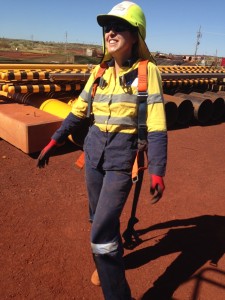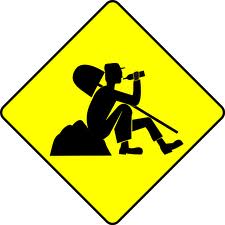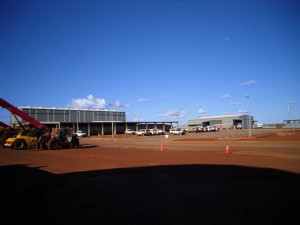The Australian industry I worked in has its own culture and terminology.
At the top of the shock heap is the seriously overdone safety rhetoric and compartmentalization of jobs.
Safety requirements can mean hours between the start of the work day and the commencement of actual work. Yes, even to do something really tiny, like replace ten plastic cable ties or change a light bulb.

Just to drive a cherry picker onto the bed of a semi-trailer, I had to don a full-body harness and clip-in to the basket.
By the time one has acquired a (redundant) safety harness, assembled tools, written a Job Hazard Analysis that itemizes every single thing that could go wrong and what workers intend to do to prevent it, done the pre-start checks on the machines to be used, and acquired a working at heights permit from the safety department, it’s almost time for the first break of the day!
In an attempt to legislate common sense, I feel what’s actually been achieved is inefficiency and decreased vigilance. That’s right. Decreased. It seems the enormous number of rules makes people feel like they are swaddled in cotton (they kind of are). Because they believe the danger has been legislated out of the equation, they tend not to question their task.
Another quirk: jobs are broken down into little pieces, each of which comes with a system of hoops to jump through before you obtain a piece of paper that says you know what’s up. The rigid regulations mean I once watched six guys do a job that it really takes two bodies to accomplish. There was a crane driver, his helper, the supervisor, the welder, the cherry-picker driver, and the “spotter” for the cherry picker. At no point in time were more than two people engaged in the action. Which means that at every point in time, four guys were sitting there waiting to contribute their piece to the puzzle. And getting paid mad scrilla to do so.
Which brings me to the work ethic. Stunning.

Gimme my money!
Having rules that necessitate standing around means people have become accustomed to not doing much and getting paid for it. Some have come to expect it. To feel entitled to it. One guy told me, “Once you’ve worked as [his profession] up in the mines, you’ll never get hired in the city again. They know working up here makes people lazy.” I’d say it’s certainly true to an extent. Although there were guys who really busted their asses, and not surprisingly, they were often immigrants.
Examples of this safety/qualifications/compartmentalization madness:
- I now own an additional 6,000 pens, one from each training I had to attend.
- I have a binder worth of pieces of paper confirming I know how to do a variety of relatively menial things.
- It was recently deemed unsafe for scaffold builders to inspect their own safety equipment. This must now be done by an “advanced rigger.”
- Acronyms abound. We wrote and signed JHA and JSCs every day. I had to give my VOC on the EWP to the HSE department. (respectively: Job Hazard Analysis, Job Start Card, Verification of Competency, Elevated Work Platform, and Health Saftety & Environment)
- You can be personally fined $5,000 for forgetting to put your seat belt on when driving the 100 yards between a storage container and job site.
- If you get hurt at work and it’s determined the cause of the accident was you not following procedures/your negligence, you’re ineligible for workers compensation.
- A 12-hours-door-to-door policy attempts to manage fatigue by counting drive time towards hours worked. (My last 12-hour job was 15 hours door-to-door and no way did we get paid for our two hours of drive time.)
On par with the crazy culture was quirky vocab. I picked up “all sorts” from my “workmates.” Industry lingo like:
- “working away” — American’s don’t have this unique Fly-In-Fly-Out (FIFO) situation in the densely populated land of milk and honey, therefore no comparable phrase. However, hearing, “My ________ works away” the first few times didn’t immediately convey to me that the person was gone for days or weeks at a time working on a mine-site.
-
“on site” — Where you go when you work away. In response to a party invite, you might say, “I’d love to, but I’ll be on-site all that week.
- “upskill” — a fancy name for paying for additional pieces of paper that say you know how to do things. One radio ad encouraged, “skilling” for your future!
- “ticket” – what you get when you upskill, i.e. the name for the pieces of paper. I’ve got my forklift ticket, my EWP ticket, and my telehandler ticket.
- “plant” — one of the most befuddling industry terms. Job vacancies abound for multi-plant operators. This includes road plant. But “fixed plant” exists, too. No, this is not botany. Closest translation: plant = machinery, both stationary and mobile. Why? No one knows.
- “duty of care” — this is Australia-wide. A legal term leveraged by both employees and employers. Business have a “duty of care” to provide safety gear. Workers have a “duty of care” to show up “fit for work” so they don’t put anyone else at risk.
-
“window seat” — a euphemism for getting fired, since it’s necessary to fly to and from the job site. Telling a supervisor where he could stick it earned two employees a “window seat.” I guess aisle seat just doesn’t have the same ring.
- UV Index — while this is not an Australian term, it’s way more important here. Every morning, we were told the UV Index level, usually “extreme,” and told to be vigilant about sun protection
- R*GBY — not only is Rugby a popular international sport, it also serves as a mnemonic device to remember electrical inspection colors for each quarter of the year. It’s better than the random, esoteric, U.S. system that I have long since forgotten.
- “skylarking” — a cute term for horseplay. There was actually a power-point slide in one of my trainings that said, “You must not skylark.”
Also in the word world are the funny names for all the different jobs. I’ve mentioned Australians love the diminutive, which is adorable for me. I told one of my “work mates”, regarding the common diminution of his last name (Blake), “In the U.S., only your wife would call you something like “Blakey,” and even then mostly in private.” In the same vein, the professional Australian world has:
- Sparkys — i.e. electricians
- Brickies — i.e. bricklayers. (Yes this is an occupation in and of itself, instead of under the umbrella of stone mason.)
-

Proof that carpenters as “chippys” is only popular in Australia? This is the main image in google results for “chippy.” Whaaa??
Chippy — i.e. carpenter
- Scaffie — i.e. scaffold builder (Yes, this it’s own job.)
- Boily — a job America hasn’t divided into tiny pieces. To this day, I don’t really understand why being a “boilermaker” is any different than being a welder. Web research says, “A boilermaker is a trained craftsman who produces steel fabrications from plates and sections.” I do not understand what keeps a welder from fabricating things. Southern Hemisphere?
- Tradies — a “qualified” tradesperson
- Fitter — a mechanic of sorts. How this is it’s own job, I don’t understand. The department of immigration says, “Fits and assembles metal parts and subassemblies to fabricate production machines and other equipment.”
- Dogman — directing the crane operator from the ground. Yes, you can get your “dogging ticket.” In fact, you must, if you are to do any “dogging.”
-

Also not the dogman we are talking about. Much creepier, in fact.
Rigger — overlaps with scaffie, but generally “riggers assemble, install, position and secure construction rigging such as working platforms, pulleys and winches used to undertake heavy lifting for construction projects. And they lift stuff. Yes, that’s a whole job. Just that. What does one do when nothing needs rigged or lifted? Well, go have a cuppa.
Or get yourself another ticket. ♣






1 ping